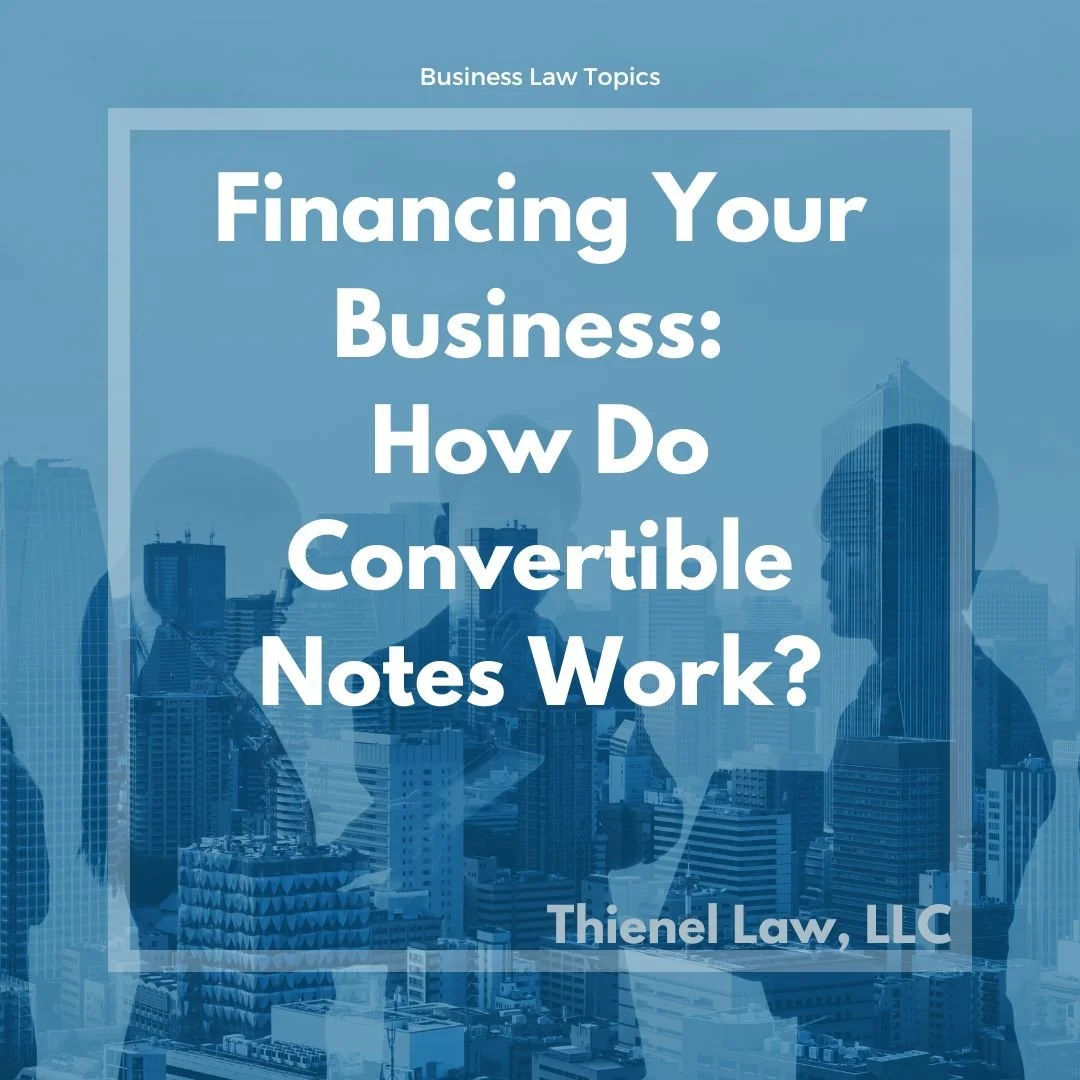Financing Your Business: How Do Convertible Notes Work?
The convertible note, also called a convertible bond, is a financial instrument that lets its holders exchange them for equity in the company. These instruments are usually issued by corporations and governments to raise capital. Our Maryland business attorney discusses everything you need to know about convertible notes and when it's appropriate to use them.
Understanding Convertible Notes
Convertible notes are short-term loans that get repaid through an ownership interest in the company rather than cash payments of principal and interest. Usually, the conversion from a note to equity in the company happens in a later round of financing. With some types of convertible debt, however, the investor gets repayment partly in stock and the rest in cash.
Key Terms of a Convertible Note
The devil is in the details, and that maxim applies to convertible notes. You will want to pay close attention to these key terms or parameters to determine how attractive convertible notes are as an investment in a specific situation. Some convertible notes have only a valuation cap, only a discount, or both terms. All convertible notes should have an issuance date, which is the date the terms go into effect.
Maturity Date
The maturity date is the point at which the company is supposed to repay the note. In other words, the maturity date is the due date for paying the note. A hard maturity date means you have to repay the investment on the stated date. If you have a soft maturity date and the business cannot redeem the debt, they could add interest to the debt.
Valuation Cap
People who invest early in the process get rewards, like valuation caps and discount rates. If the company does well, holders of convertible notes enjoy a cap on the price at which their notes will convert into equity.
Interest Rates
When someone borrows money, they expect to have to pay back the amount borrowed plus interest. Instead of getting paid the interest portion in cash, however, the interest rate will increase the number of shares that will get issued when the principal of the note gets converted into shares.
Discount Rates
The discount rate is the compensation you get for investing earlier and taking a greater risk because of that fact. Your valuation discount will be more favorable than the rate given to later investors.
Avoiding Ownership Dilution
You do not want to give away the company to get the capital you need to launch your start-up. By way of a Shark Tank example, you would not want to give away 90 percent of the equity in the company for a $50,000 note if you think you have a million-dollar business.
The equity given in exchange for the cash infusion should leave a fair amount of the company in your hands. Otherwise, you will do all the work and, at the end of the day, have nothing in your pocket. If you plan to utilize multiple rounds of financing at different points in your company’s “life,” you want to have enough available equity to accomplish those future rounds.
Why Use a Convertible Note?
You might never get your new business off the ground without sufficient funding. The banks and venture capital firms want proof that your company is likely to succeed and that they will not lose the money you want them to invest in your enterprise.
If you cannot even get the doors open without a certain amount of capital, how are you supposed to build the track record of success they want to see before investing? It is similar to the Catch-22 of not being able to get a job without experience, but you cannot get that experience unless someone will take a chance on hiring you.
Convertible notes can make the payoff attractive to potential investors without putting you in an immediate cash flow bind. You want to make sure that the terms of the convertible notes are generous enough to attract investors without giving away the store.
Also, if a start-up needs funding pre-launch or pre-incorporation, it can avoid the appearance of impropriety by using convertible notes to raise capital if the company founders were, instead, to sell their shares at a huge profit a few months after buying them right after incorporating. You will need more hard data to perform a valuation of the business for a Series A round of funding, and you can get that after the business has been in operation for a while.
Who Should Use Convertible Notes for Funding?
If you have a great idea but are in the early days of development without a track record of sales or other objective evidence that a traditional source of business funding, like a business loan from a bank, would require, consider using a convertible note. Convertible notes do not get repaid with cash, so they will not affect precious cash flow when your company might still be financially fragile.
People who want to finance a start-up business sometimes resort to running up their credit cards, which can leave them drowning in debt with high interest rates and required monthly cash payments. If you raise seed capital with a convertible note, instead of using your personal credit cards, you can avoid these problems that could sabotage your success.
Things in your credit history might make it challenging for you to get traditional business funding. Whether you had a health challenge that left you with a mountain of medical bills, got divorced, or experienced some other life event that hurt your credit history, funding your current business with convertible notes could be a more user-friendly option for raising capital.
Investors can view convertible notes as attractive because they are a relatively easy way to get in on the ground floor of a business opportunity. Rather than investing in a volatile and impersonal stock market, putting your investment capital into convertible notes could have an impressive payoff.
Pros and Cons of Convertible Notes
Like anything else, there are several arguments both for and against using convertible notes. One of the most common reasons that an entrepreneur and investors use convertible notes is so they need not try to come up with a dollar valuation of the company when it is too early to have enough data to make a meaningful determination like that. When the next round of financing happens, there will be much more valuable data points that can get used for the valuation.
Convertible notes come with additional benefits, like these:
A convertible note is a simple legal document, so it takes less time and money to get them drafted and ready for use.
Convertible notes can get used at multiple points in a company’s development, not just at the beginning. For example, you could use convertible notes as a funding option for intra-round or bridge-capital purposes.
Of course, there are downsides to using convertible notes to finance your business. Here are some of the primary adverse consequences of convertible notes:
Future equity raises could get complicated by price expectations created by the conversion discount or the valuation cap in a convertible note.
Outstanding convertible notes are still debts of the company that must get redeemed. Without future equity rounds going through, a business without a strong cash flow stream could go bankrupt.
Sometimes, people try to avoid the bankruptcy outcome, but they can go too far. Overly burdensome terms and conditions could create a chokehold that destroys the underlying benefits of convertible notes.
You will want to work with a Maryland business attorney to achieve a balance between the advantages and disadvantages of convertible notes.
Convertible Note Alternatives
People tend to get creative when looking for funding for their fledgling business. Some entrepreneurs max out their credit cards, which is usually a formula for disaster. Others ask for help from their relatives or friends. Still, others might explore funding options like high net-worth investors, angel funds, or the traditional venture market. These alternatives have pros and cons.
Angel Investors
Private wealthy investors put their own money into a small business to help it grow. These investors might get called angels, but they are not Santa Claus. They expect to get their money back with a profit, usually when the recipient business sells or goes public.
Angel investors make investments smaller than traditional venture capital firms, but they are usually willing to give the business more time to grow. A downside is that the angel investor usually demands a significant slice of the company in exchange for their capital infusion, so dilution of your ownership percentage is a real danger.
Convertible notes, also called convertible debt, can get used when getting funding from venture capitalists, angel investors, high net-worth investors, or if you borrow money from your family or friends. The principle can be the same, even if the details are more complicated sometimes. You might have a simple understanding that your friend is lending you $10,000 that will be worth a fixed percentage of the business on a certain date, or you might have a formal document drawn up with a venture capital firm.
A Maryland business attorney can answer your questions about how to use convertible notes to launch or grow your company. Contact Steve Thienel today to learn more.


